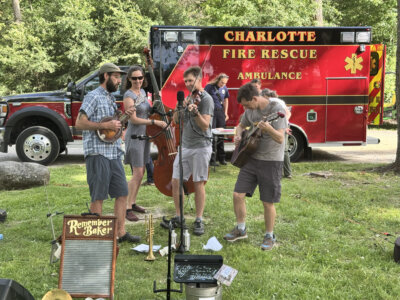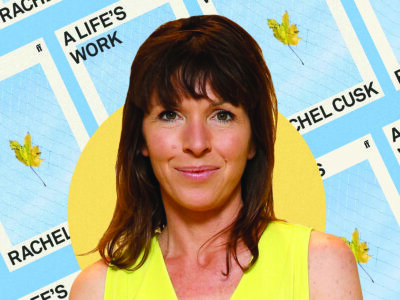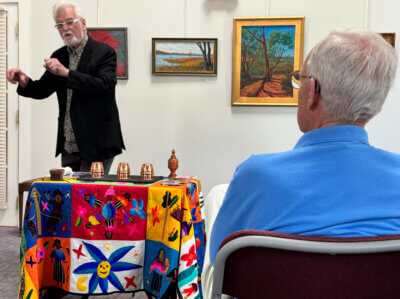Weather perfect for soaking in pool of great books
Setting: It is a beautiful Memorial Day weekend so far, after a brief bout of rain earlier today. I am writing this while sitting at a shaded picnic table, looking out over a vast expanse of green field bordered by green trees, with Mt. Philo in the distance under a blue sky and some hovering pearly white-gray clouds, which seem to be inching very slowly westward. The dogs are napping; birds are singing and chirping. I can still smell lilacs, and I am thinking about what to tell you about books.
One of the best books I have read in some time is Marisha Pessl’s Special Topics in Calamity Physics, which is not a textbook, as it may sound, but a quirky, fascinating masterpiece and one of The New York Times’ 10 Best Books of the Year, which may be how I heard about it.
“First novels are dangerous, risky creatures,” says Gothamist.com. But this debutante of a book is stunning, not like anything I have read before – a dazzling success.
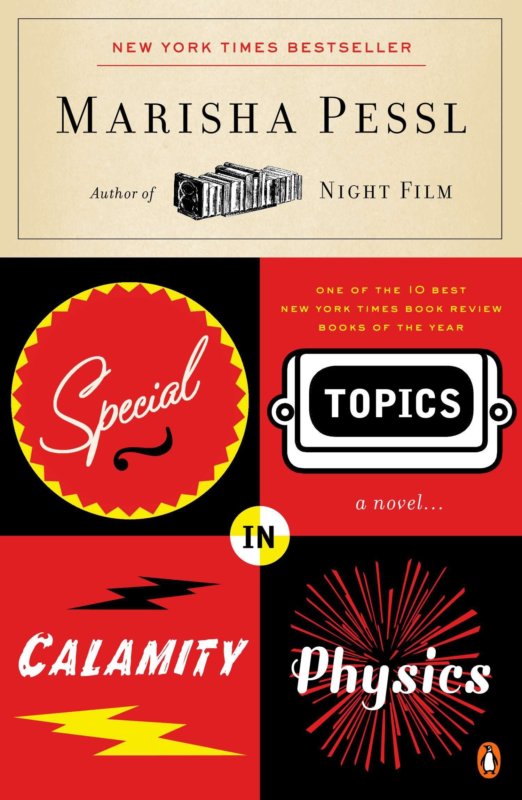 Written in the voice of Blue Van Meer — an insanely precocious teenager who lives with her dashingly handsome and quite eccentric college professor father, frequently moving with him from place to place, seldom staying anywhere for longer than a few months — the story begins:
Written in the voice of Blue Van Meer — an insanely precocious teenager who lives with her dashingly handsome and quite eccentric college professor father, frequently moving with him from place to place, seldom staying anywhere for longer than a few months — the story begins:
“Dad always said a person must have a magnificent reason for writing out his or her Life Story and expecting anyone to read it. ‘Unless your name is something along the lines of Mozart, Matisse, Churchill, Che Guevara or Bond — James Bond — you best spend your free time finger painting or playing shuffleboard, for no one, with the exception of your flabby-armed mother with stiff hair and a mashed-potato way of looking at you, will want to hear the particulars of your pitiable existence, which doubtlessly will end as it began — with a wheeze.’”
Given “such rigid parameters,” Blue always assumed she would not have her Magnificent Reason until she was an old lady, but it had been a year since she had found Hannah dead, and she still wasn’t able to get it out of her head.
Hannah, we learn right away (so no spoiler here, really), had been found hanging three feet above the ground by an orange electrical cord in the Great Smoky Mountains. But we don’t find out who Hannah is or why she ended up where she did till later. Her death is one of the several mysteries in this book that evolve over time.
Grim, dark and grisly as this all sounds, this work is also charming and funny and so well written that it frequently took my breath away. At times, it reminded me a tad of Donna Tartt’s The Secret History, but it is truly unique, truly its own, utterly unlike any book I have read.
Peppered with “visual aids” (line drawings by Blue herself), it is also riddled with (mostly fictional, I assume) citations — from Harvard University Press … to “Continental Shelf Cliff,” Oceanic Terrain … to Nietzsche … to “The Lady of Shalott,” Tennyson … to Thank God for the Telephoto Lens: Backyard Photos of the Stars … to Flannery O’Connor … to “Superstrings and M-Theory, or Mystery Theory, the Theory of Everything,” V. Close, 1998 … and on and on. And on.
This book is crazy and, also, moving, in some of the way Salinger’s Catcher in the Rye is moving. But again, I am telling you, there is nothing quite like this. It is a coming-of-age memoir, a mystery, a wild ride of whip-smart sentences, cool customers, geniuses and rich kids, beauty, youth, false identities and twisting suspense, evocative descriptions of people and place. I couldn’t put it down and I didn’t want it to end. Inventive, clever, engaging and brilliant. Highly, highly recommend.
Would make an excellent book club read, I was just thinking.
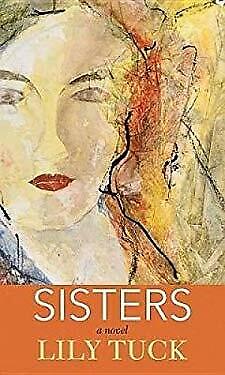 Sisters is a novel (as spare and unvarnished as the previously described is tangled and complex) by Lily Tuck that is over almost as soon as it is begun. It begins with the frontispiece, “First and second wives are like sisters” (Christopher Nicholson, Winter).
Sisters is a novel (as spare and unvarnished as the previously described is tangled and complex) by Lily Tuck that is over almost as soon as it is begun. It begins with the frontispiece, “First and second wives are like sisters” (Christopher Nicholson, Winter).
The first page has only one sentence: “We are not related — not remotely.”
I love that.
Sisters is elegantly, beautifully written. Minimalist. Nuanced. What is it about? Well, the narrator is unnamed, but we know she lives with her new husband, who has two teenagers, one male, one female. Yet what this book is really about is not any of those people, but rather, the narrator’s husband’s first wife, who is referred to throughout this very short novel by the word, she. No name. Just she.
“And we don’t look alike,” says the unnamed narrator. “She is blond, fair-skinned, big-boned, and taller than I. I have also seen photos of her as a young woman and I have to admit she was lovely. Truly. Now, she is a handsome woman in a slightly ravaged way. Her best feature is her nose — a Grecian nose, I think they call it — the sort that has no bridge and starts straight from the forehead. Like Michelangelo’s David.
“I am dark and petite.”
There are secrets and betrayal folded into this slim, poetic novel, along with a theme of yearning, longing, envy, obsession and restraint. And all through, compelling, elegant, graceful, surprising prose.
If this book were a song, it would, I think, be in a minor key. You can read it in a sitting. Likely, once done, you will want to go back and read it again.
I wrote last time about Lucy Foley’s The Paris Apartment, which I have been lately recommending to anyone who has asked me about books, especially books to bring on a trip.
Addict that I am, no sooner had I finished listening to The Paris Apartment than I started on Foley’s The Guest List, which was equivalently satisfying. One of the New York Times Best Thrillers of the Year, The Guest List was also a Reese’s Book Club Pick. Like The Paris Apartment, it had me listening whenever I had the chance. Driving. Gardening. Walking the dogs. Couldn’t stop.
The setting: an island off the coast of Ireland. The scene: an upscale wedding.
I love how Foley manages time. There is the thread of “now” (with all the trauma and horror of the party-stopping scream and the body), and also the thread of the days and hours leading up to “now.” Expertly Foley toggles back and forth between them. But it’s not confusing. It’s perfect. Perfect and never dull. A fun, well-written, satisfying, page-turning mystery. An addictive escape. Highly recommend for beach or plane, hammock or sofa. (Audible version very good, with a competent array of male and female readers.)
Happy reading. Happy spring. It’s a beautiful time to live in Vermont.
Related Stories
Popular Stories
If you enjoy The Charlotte News, please consider making a donation. Your gift will help us produce more stories like this. The majority of our budget comes from charitable contributions. Your gift helps sustain The Charlotte News, keeping it a free service for everyone in town. Thank you.
Andrew Zehner, Board Chair



